Atlanta Braves greatest all-time home run hitters

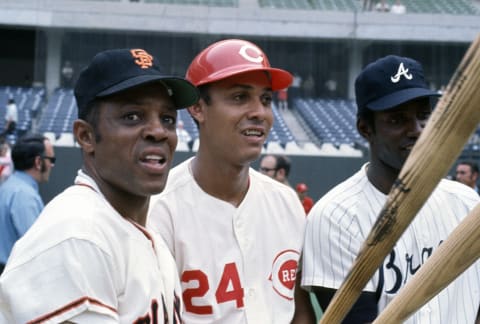
The rich history of the Atlanta Braves franchise has many of the best home run hitters of all time.
The question of the day is this: which Atlanta Braves‘ players – including those from the Boston and Milwaukee incarnations of this franchise – have hit the most home runs?
The name at the top of the list is likely obvious to most. But the rest of the top twenty is likely a very tough trivia question for all but the most dedicated fans.
Going back as far as the baseball-reference.com records will allow (1871), there have been a total of 2018 players to wear the uniform of the Braves prior to the 2020 season. It is these whose homers we will tally.
Of that group, 813 have homered during their careers. This includes many lofty names in this sport, Babe Ruth among them. Upon his return to Boston at the end of his glorious career (albeit as a National Leaguer for the first time) he logged 6 dingers.
But it was this 40-year-old Ruth on May 25th, 1935 who went 4 for 4 with 3 home runs – the final ones he would hit just prior to his retirement. One is reported to have left Forbes Field entirely.
Braves Home Run Trivia
Of these 2,018 Braves players:
- 1,205 never homered (though several still are active and will have the opportunity to change that).
- 261 have hit ten+ home runs.
- Just 22 have 100 or more.
- 201 hit exactly 1. Probably the most famous of the homer soloists (aside from Rafael Belliard), was the late Rick Camp, who hit a legendary homer in a legendary game.
Just missing the list: Sid Gordon (100) and Bob Elliot (101). Next up? Ronald Acuña Jr. is the highest active hitter not yet in the top twenty with 67 homers.
But the Top Twenty? Get your guesses ready and we’ll get started.
RICO CARTY. 20. player. 17. . .
Braves all-time home run hitters – No. 20: Rico Carty
109 HR
Named one of the 10 best outfielders of the Atlanta Braves in a companion list we recently witnessed in these pages, Rico Carty might have been a lot higher on this list if not for enough injuries over his career to keep an entire Orthopedic practice going strong.
Though he lasted for 15 seasons in the majors overall, Carty averaged just over 110 games per year – and missed out on 1968 and 1971 entirely.
When he did play, Carty was a hitter… 204 homers, a .833 OPS (132 OPS+), and a career .299 average. But that doesn’t say enough, either.
After 2 debut games in 1963, Carty broke out in a big way in 1964: .330 average, .942 OPS with 22 homes and 88 RBI… marks that put him second in the Rookie of the Year balloting.
Carty’s best season came as a 30-year old in 1970. He led baseball with a .366 average and .454 OBP. 25 homers and 101 RBI helped boost him to a 1.037 OPS.
While an All-Star that season, it seems a crime that Carty didn’t get more respect for the MVP award. He finished 10th despite an OPS better than anyone not named McCovey (who finished 9th).
As a 36-year-old in Cleveland (1976), he hit .310. In 1978 during his age 38 season, Carty hammered out 31 homers and 99 RBI in 145 games combined for Toronto and Oakland.
Rico Carty was a Brave from 1963 through 1972. He pounded out 109 homers behind the tomahawk, which – thanks to health issues – kept him in the shadows behind three Hall of Fame teammates.
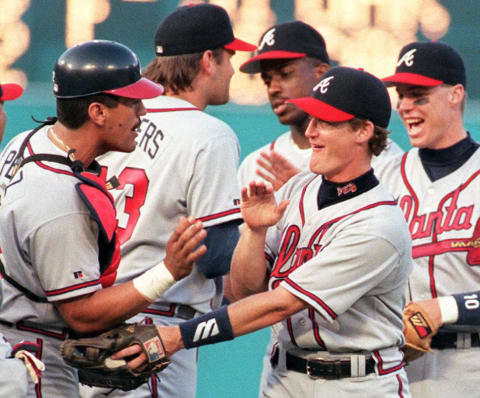
. . Jeff Blauser. 19. player. 17.
Braves all-time home run hitters – No. 19: Jeff Blauser
122 HR
In reading about Rico Carty, it might have surprised you that “only” 109 homers are currently required to make the Top 20 in the HR history of the Atlanta Braves franchise.
It might surprise you even more that one of the members of this list called the shortstop position his home for the bulk of his major league career – particularly one who slugged just .406 for his career.
Jeff Blauser was not a great defender (.964 fielding percentage at SS) nor was he considered to have a power bat on the offensive side. What he did, though, was consistent and helpful to the club on both sides of the ball. That kept him in the league for 13 seasons as a Brave (11 years) and a Cub (2).
Blauser, like Rico Carty, fought his share of injuries, and thus averaged just over 108 games per season.
Averaging .262 overall, Blauser had two different career years of note: 1993 and 1997, hitting .305 and .308 respectively.
1993 got him a nod on the National League’s All-Star team and several votes for MVP.
It was in that latter year (1997) at age 31 where Blauser slammed 17 homers – a career-high in what would be his last season as a Brave. It also earned him a Silver Slugger award and a smattering of MVP respect as well.
There’s a Draft in Here
Jeff Blauser was actually drafted originally by the St. Louis Cardinals as part of an interesting 1984 draft class.
In those days, there were multiple drafts and multiple segments of the draft. In January’s regular session, Blauser was taken 8th overall by the Cardinals.
Of all those first-rounders selected, his career was easily the best, though St. Louis didn’t get him: Blauser did not sign.
Instead, he was still draft-eligible in June when the “Secondary Phase” of the draft was held. In that session, the Atlanta Braves took him fourth overall. He signed.
There are a couple of other names of note that came up during the 1984 draft:
- June/2nd round, 31st overall: Greg Maddux (Cubs)
- June/2nd round, 47th overall: Tom Glavine (Braves)
Blauser was still a fixture on the Braves during the early portion of the glory 90s years, but also knew the depths of the bad years that came earlier, debuting in July of 1987 – just a month prior to Glavine’s first appearance.
He also had a reputation as a Cub killer: hitting 11 homers at Wrigley Field as a visitor, and 4 more against them while in Atlanta. Twice he had 2-homer games at Wrigley and once – on July 12, 1992 – he pulled off a hat trick of homers while hitting just .222 on the year!
Maybe that’s why Chicago picked him up in 1998?
Jeff Blauser hit 122 home runs for Atlanta between 1987 and 1997, never hitting more than 17 in any of those seasons. He wasn’t “replacement level” – he was a notch above that for most of his career, though fully half of his career WAR numbers came in those 1993 and 1997 seasons.
He still checks in with the 19th most in the long history of this franchise.
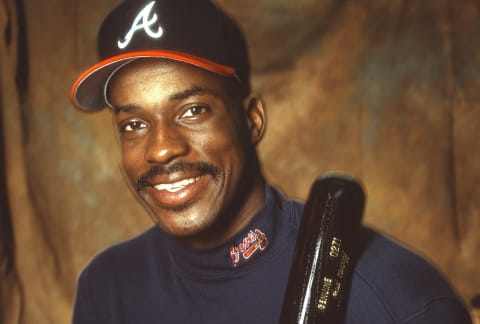
FRED McGRIFF. 18. player. 17. . .
Braves all-time home run hitters – No. 18: Fred McGriff
130 HR
In his day, Fred McGriff was quiet, unassuming, and would simply beat your team with his bat as one of the most feared lefty hitters of his generation.
His career spanned 19 seasons, and though he played for six different teams, don’t call him a “journeyman.” McGriff was a notable presence and a centerpiece in the lineup on every team he was with. Teams wanted his offensive firepower.
During this brilliant career, the Crime Dog amassed 493 homers with a .284 average, 134 OPS+, and 52.6 bWAR. A strike-shortened 1994 likely cost him the games needed to get to the 500 plateau.
The 1994 All-Star Game in Pittsburgh stands as a testimony on McGriff’s status at the time. He wasn’t elected as a starter, but was named to the club for the National League and told that his role would be as a situational hitter… just in case his league needed him.
They did. Down by a score of 7-5 going into the bottom of the 9th, the American League had future Hall of Famer Lee Smith on the mound to close out the game.
With a runner on, McGriff was inserted with a chance to tie the game. He did. Over the left-center field fence. The game was tied at 7-all.
The National League won in 10 innings, but it was McGriff being “the man” who set it up.
Starting with a Bang
McGriff was famously acquired from San Diego on July 19, 1993 for three minor leaguers as the Atlanta Braves were struggling to keep pace with the San Francisco Giants.
The aforementioned Gwynn was upset by the deal, and even let his feelings for the players acquired be known:
“You trade somebody like Freddie McGriff, you expect to get some quality in return,” Gwynn said. “I’m frustrated. I can’t understand why we’re doing what we’re doing.”
The next day, Atlanta Fulton County Stadium caught fire and so did the Atlanta Braves. But the presence of McGriff propelled his new team to prevail in an epic pennant race as the Braves caught the Giants and then passed them up on the last day of the regular season, 104 wins to 103.
McGriff whacked 19 home runs for Atlanta in that season’s second half, and he hit 130 overall from 1993 through the 1997 season.
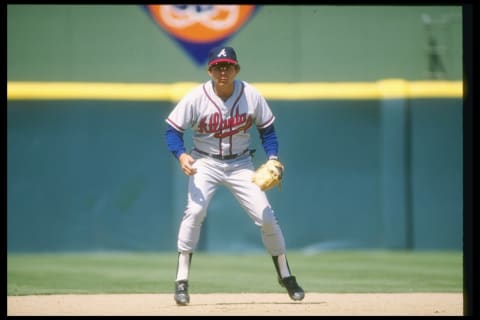
player. 17. . . . darrell evans. 17
Braves all-time home run hitters – No. 17: Darrell Evans
131 HR
It took a while before Darrell Evans was ready to become a professional baseball player.
He was drafted five times between 1965 and 1967 before a team managed to get his signature on a contract: the Cubs, Yankees, Tigers, and Phillies were all unsuccessful. The (Kansas City) A’s managed to finally win his favor as a 7th rounder.
Even after that, Evans proved elusive: by 1968, the A’s had moved to Oakland, but Evans was left exposed in the Rule 5 draft and the Atlanta Braves selected him that Winter.
Because of his youth and Rule 5 status, Evans didn’t play much early on, debuting in just 12 games in both the 1969 and 1970 seasons.
By 1972, he became the full-time third baseman and stayed at either that position or first base into his last Atlanta season in 1976… well, almost his last Atlanta season.
When you think of third basemen, the word “power” usually comes up as it’s traditionally been a position where a big hitter plays. Evans had that capability on occasion.
In 1973, he belted out 41 home runs as part of a trio of Braves teammates who reached that 40-homer milestone: Evans, Hank Aaron, and Davey Johnson.
But Evans was entering his prime at his age 26 season that year. Yet he wasn’t able to match that – or even reach 30 dingers again – until a 36-year-old in 1983 when he hit exactly 30 with San Francisco.
He went on to club 40 as a 38-year-old Detroit Tiger in 1985, then 29 and 34 more in the following seasons.
Evans made a return visit to Atlanta in 1989 as he turned 42 years old. In 107 games, he hit just .207, but also managed to swat 11 more dingers.
That raised Evans’ home run count as an Atlanta Brave to 131: one more than Fred McGriff and good for the 17th position on this list of all-time Braves power men.
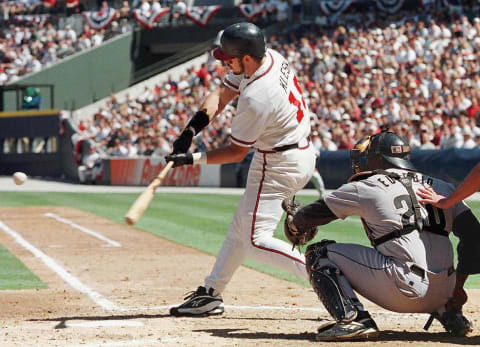
player. 17. . . . Ryan Klesko. 16
Braves all-time home run hitters – No. 16: Ryan Klesko
139 HR
1995 World Series, Game 5. In Cleveland. 9th inning. Jose Mesa is on to close out the game with a 5-2 lead with the home-standing Indians trying to claw back to a 3-2 deficit in the series. This was essentially a lock, for Mesa led all of baseball with 46 saves in 1995. No one else had more than 38 that year.
But this was a case of the ‘”game within the game”. Already, Fred McGriff (of course) had touched up Mesa for a double and was now standing on third with 2 outs.
So Mesa only needs to get 24-year-old Ryan Klesko, and despite how hot Klesko was (he hit .313 in the series with a 1.296 OPS to lead all Braves), there was truly nothing Klesko could do that would hurt the Indians. Even a homer would only bring Atlanta up to a 4-5 deficit.
You could see it in their eyes and the cameras showed it well. Mesa wanted to find out what this 24-year-old kid had. He was simply going to challenge Klesko. Klesko knew it too.
Two pitches. Two strikes. As pointed out on the MLB.com video of this AB, Mesa hadn’t allowed a homer to a left-handed batter that entire year.
At least… not until that third pitch. Outer half and up, but somehow Klesko got the bat up and around on the fastball and forced it into the rightfield seats. It was indeed 5-4 Cleveland.
Alas, that was the final score as Mark Lemke was over-matched by Mesa, but it’s still a story that illustrates just how good Ryan Klesko could be when he was focused during a hot streak.
Ryan Klesko was a home-grown Brave, drafted in 1989’s 5th round out of a southern California high school. He debuted in the majors just three seasons later as a September call-up in 1992.
By the end of the 1990s, Bobby Cox needed something else: a hitter who played better defense, a hitter that wasn’t streaky, and a hitter who didn’t have to be substituted for when a tough lefty was on the mound.
Klesko really didn’t have a natural position on the field and generally would have been better suited in the American League as a DH, but his fate was as a National Leaguer with the Braves and Padres, plus a cameo appearance with the Giants in 2006.
For today: he remains our 16th-most prolific homer hitter with 139 of his lifetime 278 homers – exactly half – coming as a Brave.
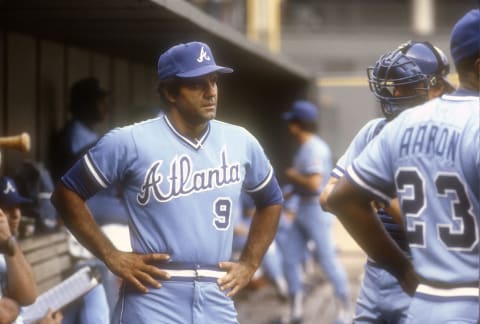
17. . . . Joe Torre. 15. player
Braves all-time home run hitters – No. 15: Joe Torre
142 HR
In the 1957 World Series, Torre played in all seven games for the Milwaukee Braves, hitting two homers in the process as the Braves won their second-ever World Championship.
Oh, wait… that was Joe’s older brother Frank Torre!
Yes, when you’re talking about someone named “Torre” in conjunction with Braves baseball, you’d better be sure which brother you’re talking about, for both played – and played for a while – behind the tomahawk.
Frank’s tenure came from 1956 to 1960 in Milwaukee. Joe Torre shared the field briefly with Frank in 1960 – 2 games – but then Joe became a regular as Frank moved on to the Phillies.
Joe’s time as a Braves then came from late 1960 until the middle of Spring Training in 1969.
At that point, Joe – a catcher and first baseman by trade – had established himself as one of the game’s better players.
In fact, he’d made All-Star teams for five straight years through 1967, was runner-up as Rookie of the Year in 1961, and had MVP vote recognition in three seasons as a Brave.
But the Cardinals and Braves hooked up on a blockbuster 1-for-1 deal in 1969: Orlando Cepeda came to Atlanta while Torre went to St. Louis.
The Hall of Fame archives suggest this was a deal between a pair of future Hall of Famers that benefited both clubs. Truth is that St. Louis got more out of Torre – even as they switched his position on the field to third base.
- At the time of the trade: Torre was 28 years old; Cepeda 31.
- Torre stayed with his new team through 1974; Cepeda was a Brave until part of 1972 and played sparingly in 71-72.
- Torre was a 4-time All-Star afterward; Cepeda was not.
- Torre won the MVP award in 1971.
- Torre with St. Louis: 22.4 bWAR; Cepeda with Atlanta: 7.9; the pair were essentially equal in 1969.
Cepeda played first base for Atlanta, and with him there – Bob Didier took over behind the plate – the Braves did win the NL West that year before falling to the Amazin’ Mets in the NLCS. It’s hard not to think that the long-term result would have been better by keeping Torre around.
Joe Torre, of course, has gone on to bigger and better things, and while his career has taken him to Cooperstown, the debate is that he probably got there on the strength of his managerial run as a Yankee.
Frank Torre had just 13 career homers; 12 as a Brave. Brother Joe mashed 252 taters overall.
The younger brother’s 142-homer tally as a Brave puts him fifteenth on our list.
FOOTNOTE: At right in the photo above is Tommie Aaron, brother of Hank and Atlanta Braves coach that year. This would have been just a year prior to Aaron’s untimely passing from leukemia in 1984 at the age of 45.
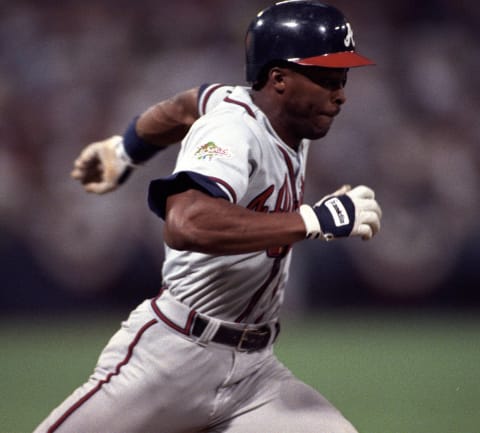
player. 17. . . . Ron Gant. 14
Braves all-time home run hitters – No. 14: Ron Gant
147 HR
In the 4th round of the 1983 draft, the Atlanta Braves chose an athletic high school outfielder out of Victoria, Texas by the name of Ronald Edwin Gant.
He started slowly in the minor leagues, seemingly stalled at the A-ball level, until a 1986 break-out year. Prior to that, Ron Gant had managed 11 homers in about 2½ seasons, but suddenly he had a burst of 26 dingers and then the only question left was “how quick can we push him to the majors?”
The answer may have been “too quickly” as he got his first cup of coffee in late 1987. In contrast to the treatment of many September call-ups, this wasn’t a sip: Gant saw plenty of action: 21 games, 86 plate appearances. He more-or-less held his own, too, by hitting .265 with 2 homers (despite a 69 OPS+).
After that, though, Gant didn’t become a full-time regular in the lineup until 1990… and then he burst out like a just-released lion. A .303/.357/.539/.896 slash line with 32 jacks even got Gant some MVP votes.
1991 and 1992 had some dips in the production, but Gant rebounded with a 36 homer season in 1993, getting 5th place MVP honors.
Then… it happened. The AJC has the details:
The Braves rewarded Gant with what was then the biggest one-year deal in baseball history [$5.5 million] but then came the dirt bike accident in the offseason. Gant’s injury brought a large group of media to Piedmont Hospital as fans around Atlanta wanted to know what the prognosis was for one of their favorite players. It wasn’t good as the right leg was severely damaged and a rod had to be put in to repair the compound fracture.
Gant didn’t play in 1994. The Braves were not happy, to say the least, but they had an out clause available to them and they exercised it.
Gant’s dirt bike experience was a violation of the terms of his contract and the Braves released him, subject to a $900,000 termination payment.
Gant doesn’t argue that. He wanted to stay with the Braves, but that one incident effectively forced a decision that changed Gant’s career – and nearly ended it outright.
Ron Gant is still known quite well among Braves’ fans as the runner who was taken advantage of by Minnesota’s Kent Hrbek in the 1991 World Series. This was a key play among many in that classic, mostly because of just how close the teams played each other the whole way.
Gant ended up with 321 homers in a career spanning parts of 16 seasons through 2003. Stops at Cincinnati, St. Louis, Philadelphia, Anaheim, Colorado, Oakland, and San Diego were included.
We’ll still remember him fondly as a Brave, and at 147 home runs, he’s the 14th ranked slugger in the franchise’s history.
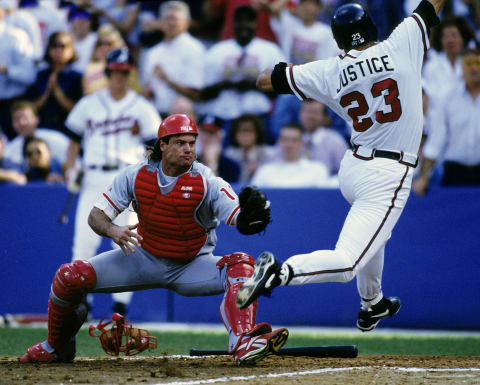
13. player. 17. . . . David Justice
Braves all-time home run hitters – No. 13: David Justice
160 HR
Ron Gant was called out in that infamous 1991 World Series play, but it was David Justice who called out Braves fans before the fateful Game 6 of the 1995 World Series.
In those statements, he was comparing and contrasting his own hometown faithful with those in the city they had just left: Cleveland. He wanted more of a response and more intensity from everyone as the series returned to Atlanta.
He got it – no doubt. While fans cheered loudly throughout the game, Justice got his own reception. He was booed.
That continued until the 4th inning when he made his own contribution: a double. But that wasn’t what really turned the crowd around.
6th inning. Justice batting lead-off. 1-1 count. Fastball … up and on the inner half from a left-handed pitcher (Jim Poole) to a left-handed hitter.
Didn’t matter. Boom.
Tom Glavine was pitching the signature game of his life. David Justice had the signature hit of his.
Was it the biggest hit in the history of the Braves franchise? That’s hard to say, but it was the winning RBI of the decisive game that gave the Atlanta Braves their lone – so far – World Series championship. That puts it high on the list, for sure.
Justice was a 4th round pick of the Braves in 1985, generating 40.6 bWAR and a 129 OPS+ with 305 total home runs in 14 seasons.
That’s a heckuva career by any measure. The majority of his MLB time came with Atlanta, who kept him through his age 30 season.
Those same Indians agreed to a huge trade with Atlanta before the 1997 season, sending Justice and Marquis Grisson to Cleveland for speedy outfielder Kenny Lofton and reliever Alan Embree.
He was dealt to the Yankees from Cleveland in the Summer of 2000, winning another ring with that club.
Justice pounded out 160 home runs as a Brave. That’s the 13th highest total of any player in franchise history.
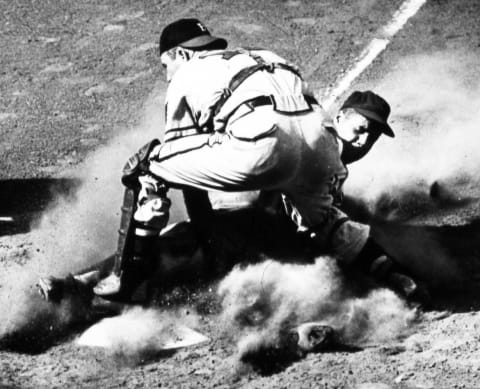
. . . Del Crandall. 12. player. 17
Braves all-time home run hitters – No. 12: Del Crandall
170 HR
Del Crandall isn’t somebody that you’d expect to see on this list – even if you were a follower of Milwaukee Braves baseball in the 1950s. That’s because when the merits of Crandall’s game were discussed, it usually led off with talk of his defensive skills.
In fact, he was probably the best defender in the game for this time, but that didn’t mean he didn’t carry a decent bat with him, too, but that wasn’t always the case.
Crandall wasn’t the prototypical catcher of his day: while he was a late bloomer in high school (growing a full foot during his 4 years there) he was also athletic; not looking like the stocky, dwarf-like shape so many seemed to be.
But Crandall had been catching in some way or another since the fifth grade, so he already had a feel for the position well ahead of his years.
He could have been the first “bonus baby” signing, which certainly had to be tempting to his depression-era family. The Dodgers practically begged his to join them, offering $20,000 (over a quarter million in today’s money). That was said to be twenty times the family income then!
But Crandall’s father advised “no” as the terms of the bonus baby arrangement would have stifled his son’s development. Additionally, there was a concern in the family that the Dodgers had a loaded farm system that might block young Mr. Crandall along the way.
So instead, it was the Boston Braves who landed the fledgling catcher – still for a tidy $4000.
Crandall learned to hit in the minors and was called up quickly – in 1949. But he’d just gotten started on a major league career when the Korean War intervened and took him away from the game for 2 years.
When Crandall returned, it wasn’t to Boston. Instead, it was Milwaukee, as the Braves relocated that season. But what a team it was.
Crandall was catching pitchers like Warren Spahn, Lew Burdette, and Ernie Johnson while hitting alongside Eddie Mathews, Hank Aaron, Joe Adcock, Red Schoendienst, and even Frank Torre.
Crandall was a Rookie of the Year runner-up in 1949 (despite only 67 games) and was an eleven-time All-Star. He won 4 Gold Gloves and garnering MVP votes in 7 different seasons.
He caught three no-hitters as a Brave and won a World Series. SABR reckons that he was the “fourth most dominating fielding catcher in major league history“.
That’s a pretty remarkable career.
Peaking at 26 jacks in 1955, Crandall hit a total of 170 homers from 1949 through 1963. He ranks number 12 on our list for that accomplishment.
Crandall retired after the 1966 season as a Cleveland Indian and as of this writing is said to be one of the two last surviving Boston Braves (also pitcher Bert Thiel, 93 years old) at age 90.
Crandall’s full bio on sabr.org contributed to this profile.. and a number of others in this post.
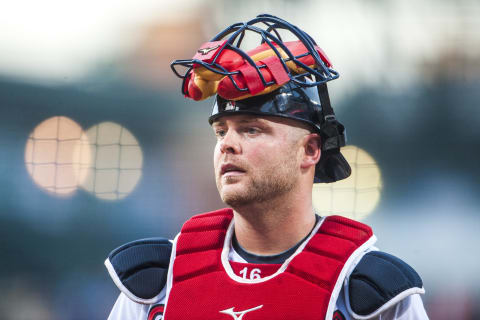
player. 17. . . . Brian McCann. 11
Braves all-time home run hitters – No. 11: Brian McCann
180 HR
Crandall isn’t the only catcher on our list. In fact, he’s not even second on the list. But our next entrant had probably the most consistent and lasting offense generated from that position that anyone else has ever put together in a Braves uniform.
In 2002, the Atlanta Braves chose a pair of home town high schoolers at the top of their draft: outfielder Jeff Francoeur and catcher Brian McCann. They grew up together in the organization and debuted in the majors within a month of one another.
While Francoeur began with a bang, his flame couldn’t be sustained; McCann’s continued for 10 seasons in Atlanta – counting his 2019 return engagement.
His best years were clearly those from 2005-2013, prior to becoming a free agent at a price point that the Braves simply couldn’t handle.
But what a run it was: good durability – until nagging injuries began to take their toll – while playing 130+ games from 2006-2010, then 128/121/102 as he struggled with those physical issues.
McCann went to the Yankees in 2014 and was dealt to Houston for the final two years of his 5-year free-agent contract.
In the process, he was part of that infamous 2017 Astros squad that banged their way to a now-tainted World Series title, a legacy he will have to live with.
But when a member of the Braves, he was a seven-time All-Star with five silver slugger awards.
McCann belted out 180 home runs during his run in Atlanta and 282 overall for his career. This is a total that nearly brought him into the Braves Top 10 overall, but he did leave his friend Jeff (160, 85 with Atlanta) well behind in the process.
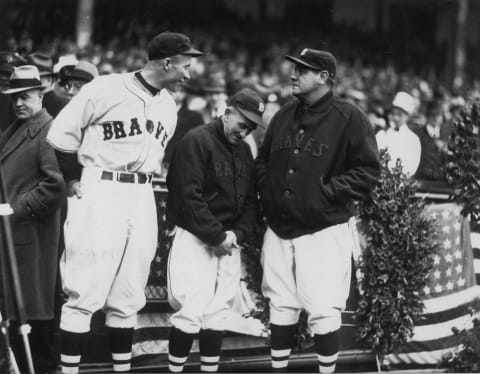
. Wally Berger. 10. player. 17. .
Braves all-time home run hitters – No. 10: Wally Berger
199 HR
It was fairly evident that the Dead Ball Era of major league baseball would not submit any nominees for this list, but we did get a Braves hitter from the earliest part of the Live Ball years.
In fact, outfielder Wally Berger was a slugger: let there be no doubt about that. If this were written strictly about the Boston Braves (or ‘Beneaters’, ‘Doves’, etc.), Berger would be number one on the list, for no one from his era hit more homers as a Brave.
Over his relatively short 11-season career in the majors (1930-1940), he averaged a slugging percentage of .522 (.881 OPS; 138 OPS+).
It took Berger a while to work into baseball, though he was confident enough in his abilities to turn down a promotion at his Door-making company in San Francisco – which would have paid more – to pursue a chance at baseball with the SF Seals in 1926.
After a few opportunities and offers came and went, Berger continued to work his way up from there. By 1929 a number of different teams held an interest in the now-24-year-old outfielder, who was then the property of the Chicago Cubs.
Boston was the winner of that sweepstake in a deal that cost them a couple of players and at least $40,000 in return. Berger made the deal worth it from Boston’s end, though there were some discussions about how much Berger believed he was worth.
His 1930 contract was for $4,500. Berger didn’t sign right away but realized that his negotiating position wasn’t the best. He then hit 38 homers in 1930 with 119 RBI, a .310 average and .990 OPS. His next contract jumped to $8,500 and that came during the midst of a Depression.
Berger was an NL starter for the first two All-Star games and was named to the next two after that (1933-37).
He remained a Brave until the midst of the 1937 season when he was traded to the (NY) Giants for a pitcher (Frank Gabler) and $25,000. That year saw the Giants reach the World Series, falling to the Yankees 4-1.
That was the beginning of the end. Injuries were a problem, but Berger returned to the World Series as a member of the Reds in 1939, again falling to the Yankees.
Berger joined the Navy in early 1942 and coached some baseball for them in San Diego. At that point, his professional playing career was essentially over.
There’s a bit of debate over his homer total as a Brave, with a biographical source claiming 190 and the stat sites suggesting 199.
Either way, Wally Berger made the most of his abilities via a tenacious desire to play baseball. Regardless of the final number, he ranks #10 overall in our lineup.
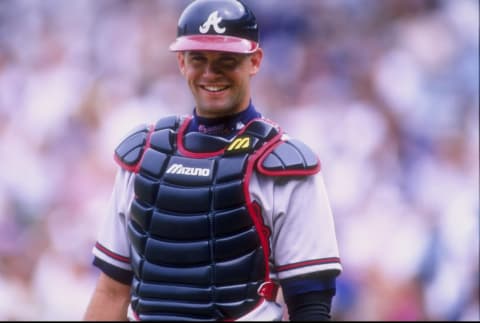
. . . Javy Lopez. 9. player. 17
Braves all-time home run hitters – No. 9: Javy Lopez
214 HR
There are a few players in the US professional baseball history who have gone by the name “Javier Lopez”, but we in Braves Country recognize one of these as our “Javy” – catcher Javy Lopez.
Over the past thirty seasons, it’s difficult to find many Braves teams without either Lopez (’92-2003) or Brian McCann (2005-2013, 2019) as a regular part of the battery. Only in the last 6+ years has that position been a year-to-year question mark.
But during the long run of 14-straight divisional titles won by the Atlanta Braves from 1991 through 2005, it was usually Javy Lopez back there and his bat was what kept him there for so long.
Getting Lopez was difficult, but one key element made it happen. Lopez is a Puerto-Rican native and though that’s a US territory, he was not subject to the standard amateur player draft.
When his international signing period rolled around, Lopez was being pursued by the Braves, Yankees, Padres, Expos, and more. San Diego and Montreal offered him $75,000 bonuses and the Braves were well back at $45,000.
The difference? His family was fans of the Atlanta Braves, entirely thanks to the TBS Superstation. The Braves got him.
That was 1987. After a relatively methodical rise through the minors, he made it to Atlanta on September 18, 1992 – doubling in his first AB. The next season, he was the starting catcher.
While not especially known for his defense, Lopez did have his moments. The 1995 World Series provided one of those while Atlanta was nursing a slim 1-run lead with the teeth of a formidable Indians lineup batting. Here’s that account as reported by sabr.org:
In the top of the eighth, the Indians’ Manny Ramirez was on first and slugger Jim Thome was at bat. Lopez had observed Ramirez’s penchant for a large lead off the bag and decided to take a chance at stealing an out. Lopez recalled, “McGriff looked at me, and I signaled to him by touching the ground and picking up the dirt. He signaled back by tugging on his pants.” On a 2-and-2 count, Alejandro Peña threw a pitch up and in, which Thome did not offer at. Lopez flung the ball to Fred McGriff at first, catching Ramirez by surprise for the second out of the inning. Thome walked on the next pitch, and without Lopez’s pickoff throw, the eighth inning might have unfolded differently. “It was the best feeling in the world,” Lopez recalled.
After the Thome walk, Paul Sorrento flew out to center against Mark Wohlers to end the inning and quench the threat.
Not mentioned in that quote was the fact that Lopez himself had hammered a 2-run shot in the sixth inning to break a tie with what proved to be the winning runs. The Braves were on their way.
Lopez enjoyed a 15-year major league career – 12 of those with the Atlanta Braves. He caught Kent Merker’s no-hitter, won a World Series, and he ripped 214 home runs.
That places him ninth overall as a Brave, with two of his teammates from the 90s still to come on this list.
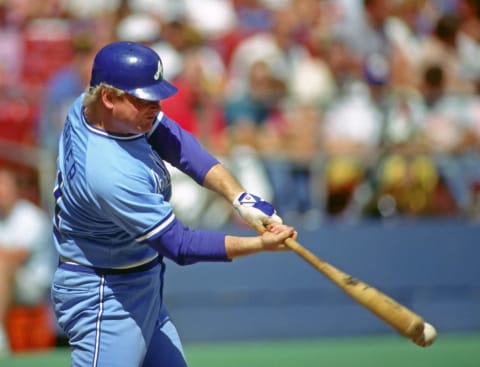
Bob Horner. 8. player. 17. . .
Braves all-time home run hitters – No. 8: Bob Horner
215 HR
As a high-schooler, Bob Horner was drafted by Oakland as a 15th round pick of the 1975 draft. That position didn’t appeal to the teen. He opted not to sign and entered Arizona State University.
- 1977: National Championship
- 1977-78: All-American
- 1978: Golden Spikes Award
- 1978: Hit .412 with 25 homers and 100 RBI.
The Atlanta Braves made Horner their first overall pick in the 1978 draft and gave him just enough time to get fitting for a uniform before inserting him into their starting major league lineup on June 16th.
How did that go? 1 for 3 with a pair of RBI, a walk, and … oh yeah: he homered off of future Hall of Famer Bert Blyleven – driving in Dale Murphy.
He played 89 games that year – pretty much all that remained in the season after the draft – hit .266 with a 124 OPS+ and twenty-three homers. He easily out-paced Ozzie Smith for Rookie of the Year honors.
So how was your first Summer after getting out of college?
While Horner began his major league journey at the age of 20, there were speed bumps along the way that limited the length of that trip:
- The 1981 strike
- A broken wrist (1983 and 1984)
- Free agency collusion – he wasn’t offered a contract in 1987, later collecting $7 million in compensation from the subsequent lawsuit against baseball’s owners (roughly the same as all of his other MLB contracts – combined).
- Shoulder injury while with the Cardinals in 1988.
By the Spring of 1989, he’d had enough, retiring at age 31.
In the meantime, Horner had been one of the feared hitters in the league, slugging .499 over his career as a third and first baseman.
He stands as the third Braves player (thus far) to hit 4 homers in a game. We will be introduced to another member of that exclusive club in a bit. Oddly enough, Horner’s feat happened in a losing effort, but here’s the final jack of that 4-pack – from May 21, 2013.
Horner was a slugger, for sure, but he was also a good hitter, posting a career average of .277, OBP of .340, and never striking out more than 75 times in a single season.
He hit a total of 218 home runs over his career, and 215 of those came as a Brave. By the margin of 1, he beats out Lopez to hold 8th place on our list.
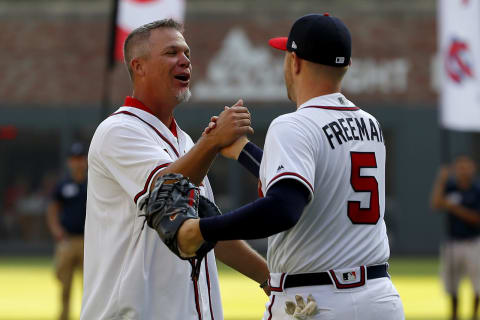
player. 17. . . . Freddie Freeman. 7
Braves all-time home run hitters – No. 7: Freddie Freeman
227 HR
The elite eight continues with the only active player currently on this list.
Before the arrival of Freddie Freeman in late 2010, the first base position was … let’s say “mostly unsettled”.
In fact, even once the Atlanta Braves became a perennially good team – since 1991 – first base was often used as the spot where a “ringer” would be brought in to help push the club toward another title.
Some of those names? Fred McGriff, Andres Galarraga, Mark Teixeira, and Sid Bream were some of the most memorable. But there have been quite a few less-able fill-ins as well.
Like 74 of them. That’s how many Braves have played first base since the 1991 season started. Even those who played it the longest (Ryan Klesko over a period of 8 years) didn’t necessarily do it consistently (or particularly well at times, either).
That ended when Freddie Freeman arrived. While 26 different players have still stood at his spot on the diamond at one time or another since 2011, here’s the breakdown:
- Freddie Freeman: 11,427 innings
- Matt Adams: 502 (mostly while Freeman was injured or volunteered to try third base (136 innings))
- Everybody else: 1123
In the history of major league baseball, the record for most innings at the first base bag is held by Albert Pujols (15,891.2). Freeman is now 15th on this list over parts of just 10 years and stands a quite reasonable chance to become No. 1 overall (with Pujols and Joey Votto [14,530.2], still being active).
But this is about home runs, and although Freeman’s hitting approach isn’t so much about going for the home run, his career slugging percentage (.504) belies the fact that his power is available when needed.
His first career homer came in Philadelphia against the late Hall of Famer Roy Halladay. His career-high came last season (didn’t everybody do so in 2019?) with 38, though he also has a 34 homer season (2016).
2019 also marked a career-high in RBI with 113. Don’t forget that he did this while pretty much swinging one-armed for much of the year, thanks to elbow deposits.
Exploiting the Youth
Here’s Freddie’s latest tape-measure shot, this coming off future Hall of Famer Charlie Freeman:
Backyard baseball ⚾️ pic.twitter.com/JZstzUR60v
— Chelsea Freeman (@chelseafree5) March 22, 2020
Well, maybe Charlie can learn how to control that attitude and get the ball down a bit more. Then he’ll be on his way.
The elder Freeman – dad – now has 227 lifetime home runs. All of these came in Braves’ colors.
While that puts him in 7th position at this moment in time, he is:
- just 13 shy of taking 6th place
- 42 short of 5th place
- 45 away from 4th place
At that point, the climb becomes much more interesting. Hopefully, he will have several years to accumulate more homers in Atlanta.
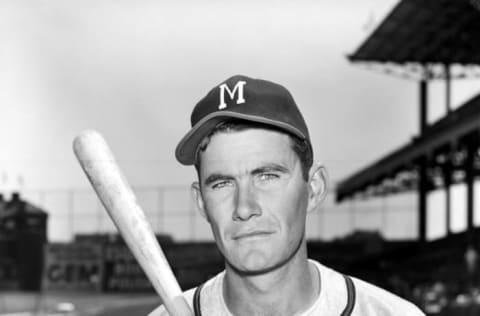
6. player. 17. . . . Joe Adcock
Braves all-time home run hitters – No. 6: Joe Adcock
239 HR
There are hitters who hit balls that are homers, and there are home-run hitters. Joe Adcock is one of the latter. If he got hold of a pitch, there was no doubt that it would leave the yard. The doubt, it often seemed, was whether the ball would leave the stadium.
Adcock hit the first ball into the revamped center-field bleachers at the Polo Grounds and the first shot over the 83-foot-high grandstand onto the upper-deck roof in left-center field in Ebbets Field, and was the first right-hander to smash one over the 64-foot-high scoreboard in right-center field at Connie Mack Stadium.
Adcock didn’t even take up the sport until college – at Louisiana State University. At 6’4″, he was there on a basketball scholarship, but this was 1945 when he arrived, and multiple sports were struggling to field full teams as a result of the war.
As a result, Adcock was coaxed into trying some baseball. To say that he was raw was an understatement, but he did quickly learn hitting: hitting enough for average, but definitely for power.
A connection or two later, Adcock got the eye of the Reds and was signed to a contract in 1947 while he was still just 19 years old.
His development proceeded well – when healthy (knee injuries were a persistent problem – but he was ultimately blocked at the major league level by the Reds preferred first baseman: Ted Kluszewski. The alternative – left field – was difficult for Adcock to master, and he had a manager who preferred a more athletic outfielder.
All of that conspired together to get Adcock traded to the Braves just before that club moved to Milwaukee – but this trade got him to a place (first base) where he could contribute consistently (injuries withstanding).
Some of Adcock’s injuries came from the fact that pitchers didn’t like him. They didn’t like that he crowded the plate and didn’t like that his homers were often tape-measure shots.
Still, his presence acted as lineup protection for the other sluggers in this formidable Milwaukee lineup: namely Eddie Mathews and Hank Aaron.
Adcock has the other 4-homer game in our lineup; that happened on July 31, 1954 (along with a double in his 5th AB). He also whacked the only hit in the 12+ inning Harvey Haddix near-perfect game. That would have been a home run except for a Hank Aaron base-running mistake.
Adcock was with Milwaukee during their 1950s hey-day years: 1953 through 1962, a period that included back-to-back World Series appearances with a title in 1957. By that time, though, he was often platooned with the aforementioned Frank Torre, owing to both streaky hitting and a propensity to struggle against some right-handers.
Still, Adcock managed to put together a strong career record: 17 MLB seasons with 336 homers, a .277 average and a 124 OPS+. Had he been healthier and more consistent (he averaged 115 games per year), 400+ homers would definitely have been within reach.
Joe Adcock was an All-Star one time, and received MVP votes in 4 seasons – peaking at 8th in 1954. Baseball-reference credits him with a career 33.6 bWAR. His Braves bWAR of 26.6 ranks 17th overall.
239 of those homers came in the uniform of the Milwaukee Braves. He will soon yield this 6th position on the list, but he will remain the 3rd best homer hitter in Milwaukee Braves history forever.
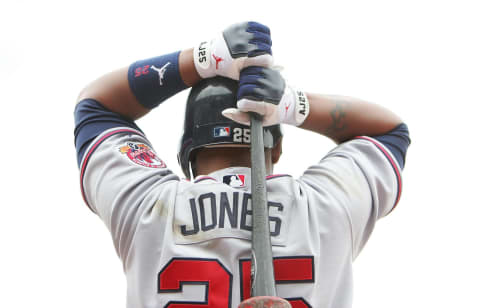
17. . . . Andruw Jones. 5. player
Braves all-time home run hitters – No. 5: Andruw Jones
368 HR
We arrive now at the Top 5, and at this level, the homer counts ramp up significantly.
While we note that Freddie Freeman’s task to catch Joe Adcock is straightforward, his journey toward the next two steps will require two things: a continued career of strong hitting and a contract extension with Atlanta.
Both may certainly happen, but the reason for this steep climb is a testament toward the work already done by our next players.
We start now with Andruw Jones. He wasn’t the first MLB player from his tiny island nation-state off the northern coast of South America, but he’s definitely been the best thus far.
The trailblazer from Curaçao was Hensley Meulens, who is still in the game as a coach (currently with the Mets). He debuted in the majors in 1989.
After his start, the Atlanta Braves suddenly became the default destination for players harvested from a population of barely 150,000.
Andrew started this parade in 1996, but was quickly joined by Randall Simon. Jair Jurrjens debuted in 2007, Andrelton Simmons in 2012, and Ozzie Albies in 2017: that’s fully one-third of the 15 major leaguers from this Dutch Constituent country.
It was just 2 seasons later after Jones signed at 17 – after hammering 25 homers in the Sally League (1995) and 34 more at 3 levels in 1996 – the Braves decided to bring him up for the playoff stretch run in August as a 19-year-old.
In 31 games and 113 plate appearances, Jones “only” hit 5 homers while hitting .217, but manager Bobby Cox nonetheless chose to write the teen’s name into the lineup for the postseason starting with the NLCS.
The Braves took out St. Louis in 5 games with Andruw contributing a .972 OPS (despite a .222 average), and then came the fateful World Series against the Yankees.
Things started well, of course, and Jones was part of the early onslaught that put Atlanta up 2 games to none: 2 homers in his first two Series AB’s will do that.
Overall? .400 hitting with a 1.250 OPS. That’s usually enough.
But so began an 11 year run for this slugging centerfielder, whose defensive instincts rank him among the top defensive CFs ever to play the game.
Andruw Jones received recognition for ten straight Gold Glove award for his defensive prowess, was an All-Star 5 times, a Silver Slugger winner twice, and was the runner-up for the MVP award in 2005 to Albert Pujols.
In that season, Jones cranked 51 homers and 128 RBI. The latter number led the National League; the former number led all of baseball.
Jones remains a controversial vote for the Hall of Fame and if he does eventually get in, it will be thanks to his CF skills as much as his hitting.
For our purposes here, though: Andruw Jones whacked 434 home runs, and in those 11 seasons with Atlanta he picked up 368 of them.
Jones is thus a strong No. 5 on our list.
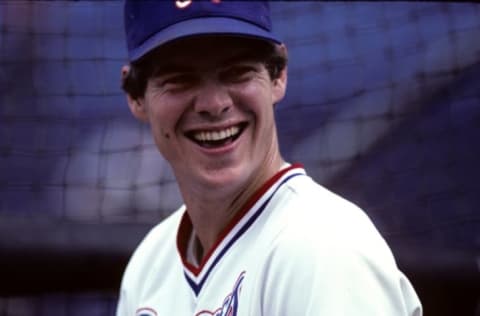
Dale Murphy. 4. player. 17. . .
Braves all-time home run hitters – No. 4: Dale Murphy
371 HR
Another position up the ladder we find another Atlanta Braves legend who has been oh-so-close to the Hall of Fame. Dale Murphy.
The credentials are excellent, but for the Hall, they often need to be undeniably great. There’s the rub as he gets no points for simply being a great human being.
Those in Murph’s corner would immediately begin the argument with his back-to-back MVP awards (1982-83) at a time when he was one of the most respected hitters in the National League.
That was 7 years in an 8-year stretch in which Murphy received MVP consideration. Along with that were 5 Gold Gloves and 4 Silver Sluggers.
The detractors would counter with his career accomplishments: 46.5 bWAR and 44.3 fWAR – ranking 232nd and 254th overall, respectively – behind players like Miguel Tejada and Curtis Granderson.
“Well, his 398 lifetime homers ranks 60th all time. That puts him in good company.”
That company includes Andress Galarraga (59th), Jim Edmonds (62nd), Greg Nettles (63rd), Mark Teixeira (55th), Aramis Ramirez (65th). None of those guys are going to Cooperstown as guests of the Hall, either.
Dale Murphy started out as a catcher, but didn’t really blossom as a hitter until he was moved to the outfield. What’s also highly strange for a former catcher, centerfield became his primary position through those best hitting years before a transition to rightfield later on.
Not bad for a tall (6’4″), lanky lad from Portland, Oregon who the Braves took as the 5th overall draft pick out of high school in 1974.
During a run from 1982-85, Murph never missed a game: 162 of them for 4 straight years. That’ll maximize your value to the Atlanta Braves.
During that same 1982-85 consecutive-games stretch, Murphy hit 36, 36, 36, and 37 homers – leading the NL in homers in both those latter years and hitting between .281 and .302 each time. Remarkable consistency.
He led the NL in RBI in his MVP years. Led in slugging in ’83 and ’84. Led in OPS in 1983. Led in walks and runs scored (in addition to homers) in 1985.
From 1979 through 1987, his OPS dipped under .800 just once: during that 1981 strike year.
In the 1980s (1980-89), only one hitter clubbed more homers than Murphy’s 308: Mike Schmidt at 313. Nobody else was that close, including two Hall of Famers in their prime: Eddie Murray (274) and Andre Dawson (250).
So for those who complain about Murphy’s 398 homers overall? That was still a pretty big number for his era. Obviously. Hall voters – more than three-quarters of them – disagreed.
Was 400 the magic number? A few more games in Philly or Colorado in 1992 or 93 might have done it. A few more games in the strike-shortened 1981 season certainly would have. Is it really about 2 lousy dingers?
Indisputably, Dale Murphy was one of the very best for quite a while. And from 1976 through part of 1990, he was ours.
Over that time, he pounded out 371 home runs. He’s also 4th highest on this list.
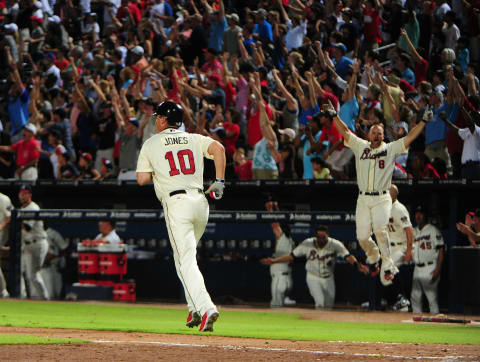
. . Chipper Jones. 3. player. 17.
Braves all-time home run hitters – No. 3: Chipper Jones
468 HR
When discussing the greatest switch-hitter of all, there are really only two names that should be in serious consideration: Chipper Jones and Mickey Mantle.
Both played for a single team over the course of their respective careers: the Atlanta Braves and the New York Yankees.
Both were strong hitters: Mantle averaged .298 over his 2401 games; Chipper .303 for his 2499 games. Mantle walloped 536 homers; Jones 468.
Jones has the distinction of being the only switch hitter ever of averaging .300 from both sides of the plate.
Mantle has the edge in OBP, slugging, and (therefore) OPS: the latter being a robust .977, though Jones was no slouch at .930. Only Lance Berkman managed to sneak in between this pair (.943) among SWH with 200+ homers.
But Chipper easily bested Mantle in doubles, which was his hallmark: 549 to a mere 344. He also had way more hits than Mantle at 2726 vs. 2415.
Jones holds 2nd place all-time for switch-hitter hits: behind Eddie Murray (3255) and ahead of the now-infamous Carlos Beltran by one and in front of Roberto Alomar by two.
Regardless of which side you come down on, Mantle was clearly the best of this era; Jones the best of his – and this time there is no quibbling: both are enshrined in Cooperstown.
It seems odd to say, but Jones could have had an even better career: 2 different knee injuries kept the first overall pick in 1990 off the field in 1994 (missed the entire season) and 2010 (missed nearly half). 2005 and ’06 also saw Jones sidelined for significant time.
Oh, but when he was healthy:
- All-Star: 8 times
- Silver Slugger: twice
- MVP (1999); votes received in twelve other seasons.
- Runner-up for Rookie of the Year
- World Series Winner, 1995
- Led the NL in OPS (1.029) in 2007 at the age of 35.
- Led baseball in average and OBP in 2008. I have no idea how he didn’t get another Silver Slugger for that season.
- He missed 34 games, and thus lost out on another MVP award despite OPS’ing 1.044.
He played third base. Should have won a Gold Glove somewhere along the line. He played left field in 2002-03 because it helped the team to do that.
He took less money for multiple years (2006-09) to help the team financially.
This is the essence of the Team Player. He stayed when he could have moved on. He made the Atlanta Braves his team. For life. That was Chipper’s stated goal and he backed it up … just like he did with that swagger he carried.
That’s why, of all the players on this list, he is the only one – so far – of whom we can make this kind of statement:
Over his completed career, all of Jones’ 468 homers are Braves homers.
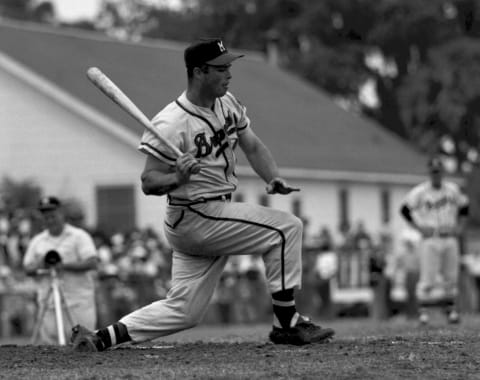
. . Eddie Mathews. 2. player. 17.
Braves all-time home run hitters – No. 2: Eddie Mathews
493 HR
Our number two is another one to start arguments about. In this case, it’s an argument about the best third baseman in Atlanta Braves (or Boston or Milwaukee) history: is it Chipper Jones or our next entry on the list, Eddie Mathews?
Well, if you go by the offensive numbers, it’s actually fairly clear:
- Homers: Mathews by 512 to 468 over Chipper Jones
- OPS+: Mathews by 143 to 141
- bWAR: Mathews by 96.2 to 85.3
- Average: Aha! Chipper wins this (.303 to .271)
Matthews was a twelve-time All-Star in a 17-year career that stretched from Boston to Milwaukee to Atlanta to Houston and finally Detroit.
He was the only three-city Brave, and as such, he was part of the World Series-winning Milwaukee Braves in 1957.
Mathews never won an MVP award – though he should have. He finished 2nd on two occasions. Both years, he had the most homers in baseball (47 in 1953 and 46 in 1959).
In 1953, he was statistically better than Roy Campanella who won despite teammate Duke Snider finishing third … and other teammates of theirs finished 9th through 12th and 14th. Sounds like the Brooklyn Dodger fix was in during that voting season.
In 1959, that split vote problem probably hurt Mathews as Hank Aaron finished third… with Ernie Banks getting the nod for the NL. You actually could make a decent case for any of the three.
Durability was a hallmark for Eddie Mathews. He played 138 games or more every year from his 1952 rookie campaign all the way until 1966, when he played 134 and 137 over the next two years.
At retirement, Mathews had played more at third base than anyone else had done. That record may have been helped along thanks to some basic research as his family believed Mathews’ path to the majors might be cleaner with the Braves than with other suitors wanting to sign him.
That proved true: he made the big club 2½ years after his high school graduation with praise for his game coming surprisingly early – and from some lofty sources:
He was considered the best hitting prospect in baseball, and even Hall of Famer Ty Cobb marveled at the youngster’s ability. “I’ve only known three or four perfect swings in my time,” said Cobb. “This lad has one of them.”
His slugging is probably underrated (and that because of our next legend) but Eddie Mathews was a no-doubt Hall of Famer in his own right.
So why argue? The Atlanta Braves have seen two hot corner Hall of Famers come through their stadiums over the years.
493 home runs as a 3-city Brave makes him number two on this list of all-timers. That’s a number liable to stand up for quite a while.
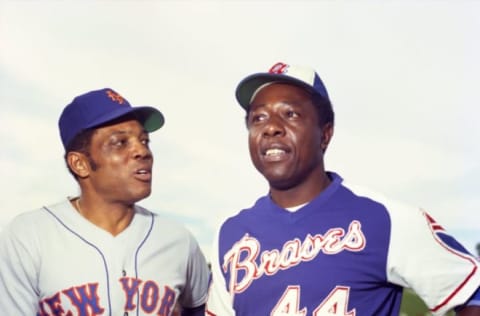
. . . The Hammer. Hank Aaron.. 1. player. 17
Braves all-time home run hitters – No. 1: Hank Aaron
733 HR
Henry Aaron not only has more than any Brave ever, but he also hit more homers than anyone has ever hit for any single team.
Not only is he number one on this franchise list, but he’s so far ahead, you could take Eddie Mathews’ second-place number of 493 homers, add in Joe Adcock’s sixth-place homers (239), and you’d still be a homer short of Aaron’s mark.
It’s difficult to appreciate the consistent production that Hank Aaron exhibited as a player for the Milwaukee and then Atlanta Braves. Let’s try:
- 23 leagues in major league baseball. 21 at a Brave – the most ever. Next closest: John Smoltz, Phil Niekro, and Warren Spahn at 20 years.
- 15 years with an OPS+ at or above. Next closest Brave? Chipper Jones with 8 seasons.
- 8 years with 40 home runs or more. Next closest Brave? Eddie Mathews with 4 seasons.
- 14 years with a .300 batting average or higher. Next closest? Chipper with 11. Then it was Fred Tenney and Hugh Duffy with 7 years (they both played at the turn of the prior century).
- He had the highest batting average as a Brave in the modern era at .310.
- Strikeouts: never more than 100 in a season.
- Wins Above Replacement: 142.6 as measured by baseball-reference.com. Next closest Brave? Eddie Mathews, way back at 94.1.
- Technically, having Hank Aaron was better on the field than Chipper Jones and Dale Murphy – combined.
- During Aaron’s career, he had seasons in which he led all of baseball in these categories: Runs scored, Hits, Home Runs, RBI (4 times!), average, slugging (4 times), OPS, OPS+, sacrifice flies, and total bases (4 times).
- Aaron’s 755 homers were the best ever when he retired, and his RBI and total bases numbers remain the best in baseball history.
There were others who (at times) were more dominating on the field than Henry Aaron. In fact, he ranks “only” 5th all time in bWAR. But Aaron was a better all-around player than Barry Bonds or Babe Ruth (unless you needed a pitcher) or Ty Cobb.
Of his contemporaries, only Willie Mays was effectively his equal, which is why this bit of history sends shudders through those watching baseball in the 1950s and 60s:
Due to his amazing ability he received two offers from the MLB via telegram. The first was from the New York Giants and the second from the Boston Braves. Years later Aaron recounted, “I had the Giants’ contract in my hand. But the Braves offered fifty dollars a month more. That’s the only thing that kept Willie Mays and me from being teammates: fifty dollars.”
Yeah. The Giants almost had both of them on their team. It was that close.
But it was the Braves – then still in Boston – who got the youngster’s signature on June 12, 1952.
733 home runs and twenty-two years later, Hammering Hank was done with the Braves – he spent the 1975 and 1976 seasons back in Milwaukee, finally slowing down at the age of 42 after such an incredible career.
Aaron will remain the best hitter in the history of the Milwaukee and Atlanta Braves for the foreseeable future. His legacy is secure. Our memories will continue to tell of his feats long after he passes on.
Next. The trades that changed the Franchise. dark
Today is one of those days as we remember him as the number one home run hitter in the history of the Atlanta Braves franchise.